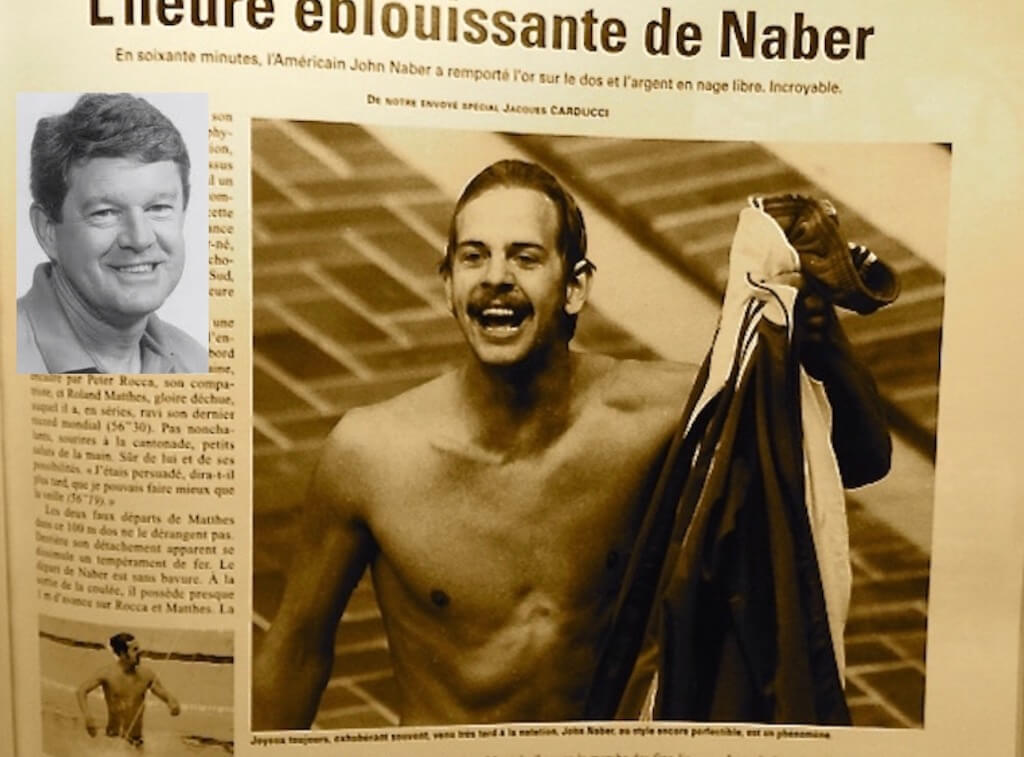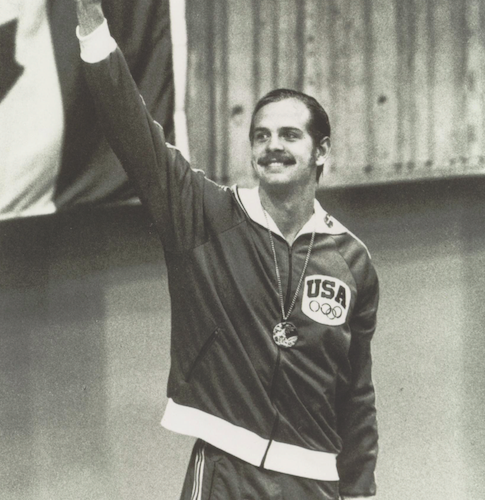John Naber Tribute To Coach Mike Hastings: The Golden Alchemy Of “Show Them What Can Be Done”

Passages: John Naber tribute to Coach Mike Hastings
“Mike was my coach on deck when I broke my first world record. He was the first man I hugged after winning my first Olympic medal. He was the first man I asked for advice, after I retired from the sport. He was my rock.”
Coach Mike Hastings passed away last week. In the comments section, John Naber, double Olympic backstroke champion with two relay golds for the USA and a silver over 200m free the three-Olympic backstroke at the 1976 Games in Montreal, left the following tribute to his coach. It is well worth publishing in its own right:
Tribute to Mike Hastings by John Naber

Photo Courtesy: Bob Ingram
I found out last week that Mike Hastings, my club coach at the Ladera Oaks Aquatic Club from 1973-1977, passed away at his home in Oregon. He lived alone.
Mike came from the Arden Hills program where Mark Spitz had been groomed for success [NB: and Debbie Meyer too]. We were eager to meet the man, and were delighted to hear that he preferred to be called Mike rather than Coach Hastings. Mike became a major force in my swimming career. He taught me a lot about life and sport, but I will always remember how much he taught me about myself. Allow me to share a few quick examples:
On his first day on the workout pool deck, as the team’s only American Record holder, I tried to make Mike feel welcome by loudly agreeing to every practice set he presented to the team. He’d quietly say something like, “8 x 500s on the six minutes,” and I’d helpfully chime in, “That’s a great idea, coach,” or, “Sounds good to me.” After three such shows of enthusiastic support, Mike pulled me aside and said:
“John, I appreciate what you’re trying to do, but I don’t need your approval. I need your obedience.” I learned about authority, that day.
A few months later, at the end of a grueling set of pulling 200s, Mike stopped the pace clock, and signaled for me to lean in. “John,” he pointed to the other swimmers, and whispered, “On this last one… show them what can be done.”
He didn’t say, show them what you can do. He said show them what can be done. In that moment, I felt I could do something that had never been done before. With a tube around my ankles and buoy between my thighs, I pulled 200-yards freestyle almost as fast as I could swim it. On that day, I believed myself possible of world records for the first time. “Show them what can be done” was his pep-talk to me before every major race from then, on.
In 1973, at the US Nationals that selected the first World Championship team ever, I was the top seed in the 100-meter backstroke. A win here would place me on the team and also on the USA medley relay. Sadly, after finishing first, an official called me out for not touching the wall on the turn (the rule at the time) but the head meet referee was not so sure.
Mike was the one to tell me the news.
He asked, “Do you want to argue the call?” I said, “No Mike, I didn’t touch the wall.” And right there, the discussion ended.
Mike could have urged me to fight a fight we might have won, but with so much on the line, he took truth as the arbiter of the decision. I learned the joy of doing the right thing, even when it costs more than you’re willing to pay. It became the choice of which I am most proud.
Mike was my coach on deck when I broke my first world record. He was the first man I hugged after winning my first Olympic medal. He was the first man I asked for advice, after I retired from the sport. He was my rock.
I have lots more Mike stories: his sharp whistle, his ingratiating smile, his demand for respect. One time referring to him, I said, “Give that boy a prize.” He put on his serious face, and spoke slowly to me:
“You can call me Roy, and you can call me Leroy, and you can call me cowboy, but don’t you ever call me Boy!” I called him Roy, the last three times I saw him.
Mike was a bit of a loner, but he agreed to be my travelling companion when I was invited to compete in the 1978 ABC Superstars in the Bahamas. For the first time, he was not my coach, but my friend. He treated me as an equal, not a kid, and it was one of the greatest times of my life. I thanked him then and I thank him now.
Mike, you helped make me become the man I am today, and I will be forever grateful.
The End of a very fine tribute.
- After Swimming World posted the obituary of Roland Matthes, Naber penned this moving tribute to his former sparring partner and friend at a watershed of soaring swimming history.




Rj Van R.J. Van Almen
Andy Benson
John Naber